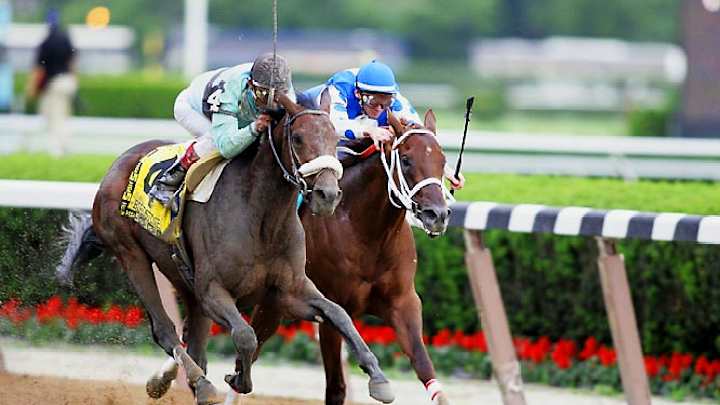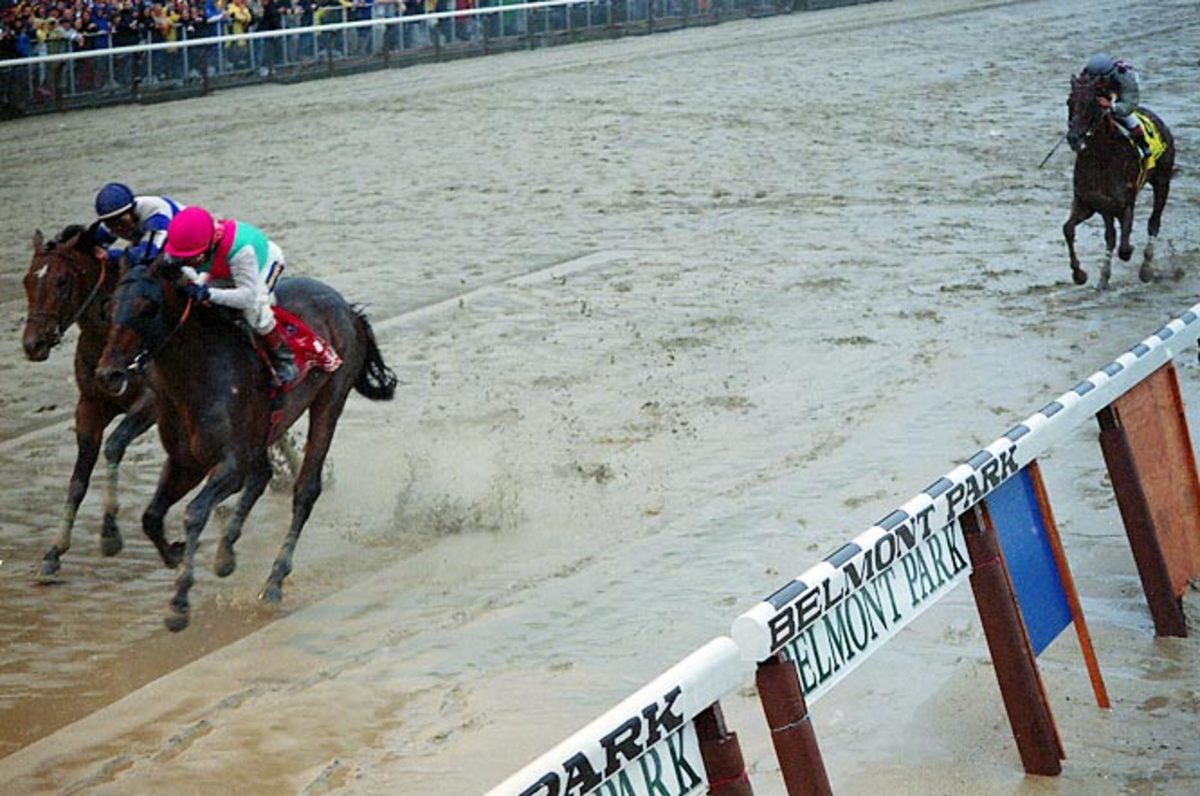Triple Crown Near-Misses

Triple Crown Near-Misses
Smarty Jones

Twenty horses have come up short in their bid to win the Triple Crown, including Smarty Jones (right), the sixth horse in eight years to enter the Belmont with a Triple Crown shot. Smarty Jones had won the Preakness by a record 11 1/2 lengths and led the Belmont by more than a length with a furlong to go, but suffered his first ever loss at the hands of a 36-1 long shot, Birdstone (left).
Funny Cide

Funny Cide (top right corner) became the first gelding to win the Derby since 1929 and ran away with the Preakness by 9 3/4 lengths, but slipped to third place on a wet Belmont track when jockey Jose Santos ran him along the rail, the muddiest part of the track.
War Emblem

After a four-length, wire-to-wire Derby win and a close victory at the Preakness, War Emblem (middle) quickly lost his Triple Crown chances by stumbling out of the Belmont gate. Though the horse came back to take the lead late in the race, he faded into eight place on the back stretch -- the worst Belmont finish for any winner of the first two Triple Crown legs.
Charismatic

Charismatic (4) was the third straight horse with a chance at the Triple Crown, but lost the lead in the final furlong after breaking his leg. Jockey Chris Antley leapt off after the finish line and held up Charismatic's body, possibly preventing further damage.
Real Quiet

Real Quiet (right) had held off charges from Victory Gallop (left) in both the Derby and Preakness, but Bob Baffert's second straight Triple Crown contender lost a six-length lead in the stretch in a photo finish.
Silver Charm

"He will win the Triple Crown, I guarantee it," jockey Gary Stevens said of Silver Charm (right) after winning the first two legs by a head and a nose, respectively. Into the Belmont homestretch, the guarantee looked good, but Touch Gold ran down Silver Charm and won by a half-length.
Sunday Silence

The nearly all-black horse made noise on the first two Saturday's of the Triple Crown, topping the overwhelming favorite Easy Goer on a muddy Derby track and again by a nose in the Preakness (pictured) after the rivals raced side by side from the quarter pole. But Easy Goer's closing speed, stifled on the two shorter races, opened up on his home track, where he topped Sunday Silence by eight lengths.
Alysheba

The son of Alydar, Affirmed's archrival, Alysheba (9) had a Triple Crown rivalry of his own, coming from behind in the home stretch to top Bet Twice in the first two races, despite nearly being knocked to his knees by Bet Twice in the Derby's homestretch. Bet Twice got revenge in the Belmont, ending Alysheba's Triple Crown hopes by 14 lengths.
Pleasant Colony

Pulling away from the Derby pack on the homestretch (pictured) and outdueling Bold Ego by a length in the Preakness, Pleasant Colony fell short by three lengths in the Belmont's longer 1 1/2 mile race.
Spectacular Bid

After Spectacular Bid won the Derby by 2 3/4 lengths (pictured) and finished the Preakness faster than Triple Crown winners Seattle Slew, Affirmed, and Secretariat, an embedded safety pin was found in his hoof on the morning of the Belmont. The injury, and his jockey's pre-race fist fight with a rival, contributed to a third-place finish.
Canonero II

The ultimate dark horse, the Venezuelan stallion barely qualified for the Kentucky Derby but came from 18th place in the back stretch to become the Derby's only foreign-based winner. He jumped out in front in the Belmont but faded in the longer distance, finishing fourth.
Majestic Prince

After Majestic Prince topped Arts and Letters by a neck and a head in the Derby and Preakness, trainer Johnny Langdon announced the horse had a tendon injury and would not race for the Triple Crown. Under intense pressure, including a Sports Illustrated article, "The Prince Ducks the Big One," the horse's owner ran Prince in the Belmont, where Arts and Letters bested the weakened horse by 5 1/2 lengths. Also narrowly missing the Triple Crown, but not pictured in this gallery, were Forward Pass (1968), Kauai King (1966), Northern Dancer (1964), Carry Back (1961) and Tim Tam (1958).
